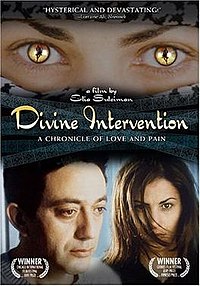| Revision as of 00:02, 7 November 2005 editXed (talk | contribs)3,794 editsmNo edit summary← Previous edit | Revision as of 01:55, 7 November 2005 edit undoJayjg (talk | contribs)Autopatrolled, Administrators134,922 edits Xed, you have failed to provide any sources for these insertions. It's been several days, please provide sources or desist in inserting them.Next edit → | ||
| Line 4: | Line 4: | ||
| One lyrical section feature a beautiful sunglasses-clad Palestinian woman (played by ]) whose passing by not only distracts all eyes, but whose gaze causes Israeli military checkpoint towers to crumble. The director features prominently as the film's silent, expressionless protagonist in an iconic and powerfully moving performance has been compared to the work of ], ] and ] . | One lyrical section feature a beautiful sunglasses-clad Palestinian woman (played by ]) whose passing by not only distracts all eyes, but whose gaze causes Israeli military checkpoint towers to crumble. The director features prominently as the film's silent, expressionless protagonist in an iconic and powerfully moving performance has been compared to the work of ], ] and ] . | ||
| Despite being nominated for the "]" award at the ] ], the film's consideration as candidate for Best Foreign Film at the Academy Awards was an occasion for considerable controversy. |
Despite being nominated for the "]" award at the ] ], the film's consideration as candidate for Best Foreign Film at the Academy Awards was an occasion for considerable controversy. It was alleged that the film was denied consideration by the California-based ] because Palestine was not a country, but spokesperson John Pavlik stated that the Academy had never made a decision on that issue because Suleiman had never submitted his film. Some have claimed that the Academy's decision was based on political considerations . | ||
| ==External links== | ==External links== | ||
Revision as of 01:55, 7 November 2005

Divine Intervention (Arabic: yadun ilahi يد إلهي) is a 2002 film by the Israeli Palestinian director Elie Suleiman, which may be described as a surreal black comedy. The film consists largely of a series of brief interconnected sketches, but for the most part records a day in the life of a Palestinian living in East Jerusalem, whose girlfriend lives several checkpoints away in the West Bank city of Ramallah.
One lyrical section feature a beautiful sunglasses-clad Palestinian woman (played by Manal Khader) whose passing by not only distracts all eyes, but whose gaze causes Israeli military checkpoint towers to crumble. The director features prominently as the film's silent, expressionless protagonist in an iconic and powerfully moving performance has been compared to the work of Buster Keaton, Jim Jarmusch and Jaques Tati .
Despite being nominated for the "Palme d'Or" award at the 2002 Cannes Film Festival, the film's consideration as candidate for Best Foreign Film at the Academy Awards was an occasion for considerable controversy. It was alleged that the film was denied consideration by the California-based Academy of Motion Picture Arts and Sciences because Palestine was not a country, but spokesperson John Pavlik stated that the Academy had never made a decision on that issue because Suleiman had never submitted his film. Some have claimed that the Academy's decision was based on political considerations .
External links
This film-related article is a stub. You can help Misplaced Pages by expanding it. |